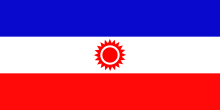
The politics of Nepal functions within the framework of a parliamentary republic with a multi-party system. Executive power is exercised by the Prime Minister and their cabinet, while legislative power is vested in the Parliament.

The Kirati people, also spelled as Kirant or Kiranti, are Sino-Tibetan ethnolinguistic groups living in the Himalayas, mostly the Eastern Himalaya extending eastward from Nepal to North East India.
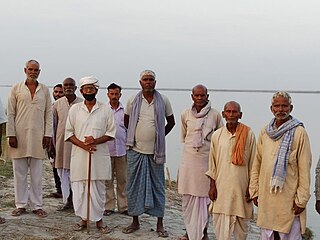
Madheshi people is a term used for several ethnic groups in Nepal living in the central and eastern Terai region of Nepal. It has also been used as a political pejorative term by the Pahari people of Nepal to refer to Nepalis with a non-Nepali language as their mother tongue, regardless of their place of birth or residence. The term Madheshi became a widely recognised name for Nepali citizens with an Indian cultural background only after 1990.

Constituent Assembly elections were held in Nepal on 10 April 2008, having been postponed from earlier dates of 7 June 2007 and 22 November 2007. The Constituent Assembly was planned to draft a new constitution and therefore decide, amongst other things, on the issue of federalism. The number of eligible voters was around 17.5 million. The Constituent Assembly was originally set to have a term of two years.

The Madhesi Jana Adhikar Forum, Nepal (MJFN), or the Madhesi People's Rights Forum, Nepal, was a political party in Nepal. It was initially not a political party as such but a political advocacy movement demanding ethnic self-determination rights with the formation of a Madhes autonomous region for Teraibasi people, an election system based on proportional representation, and the setting-up of a federal republic in Nepal. The MJFN includes former leaders of other political parties like the Nepali Congress and CPN (UML).
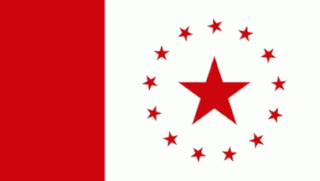
Sanghiya Loktantrik Rastriya Manch is a political party in Nepal. The party is registered with the Election Commission of Nepal ahead of the 2008 Constituent Assembly election. The party was formed through the coming together of 12 different janajati organisations.
Sadbhavana Party is a political party in Nepal. The party emerged from a major split in the Nepal Sadbhavana Party (Anandidevi) in the summer of 2007. Laxman Lal Karna was the joint chair of the party.
United Democratic Madhesi Front was a political alliance of Madhesh-based political parties in Nepal created for the Madhes Movement. It was formed in 2008 by Madhesi Jana Adhikar Forum, Nepal, Nepal Sadbhavana Party and Terai Madhes Loktantrik Party.

The first Nepalese Constituent Assembly was a unicameral body of 601 members that served from May 28, 2008, to May 28, 2012. It was formed as a result of the first Constituent Assembly election held on April 10, 2008. The Constituent Assembly (CA) was tasked with writing a new constitution, and acting as the interim legislature for a term of two years.
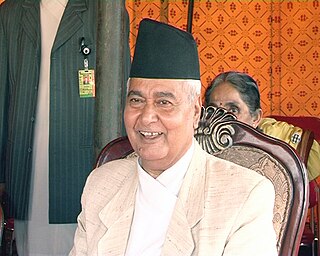
Parmanand Jha is a Nepali politician who served as the first vice president of Nepal from 23 July 2008 to 31 October 2015. Previously he served as a Supreme Court judge.

The Nepal Sadbhavana Party was a political party in Nepal that worked for rights of the Madhesi people and discriminated communities and groups of Nepal.

Chandra Kant Raut, popularly known as Dr. CK Raut, is a Nepalese Member of Parliament (MP), computer engineer, former United States Defense programmer, author, politician, activist. He is a gold medalist in the Bachelor of Engineering from Pulchowk Campus, a central campus of Institute of Engineering (IOE), Tribhuvan University. He was active in the Alliance for Independent Madhesh, to establish a country for the Madhesi people. However, he surrendered before the Nepalese state in 2018 and chose to participate in mainstream politics. In 2022 Nepalese general election, he was elected as a member of the Pratinidhi Sabha, or the lower house of Parliament.
Constituent Assembly elections were held in Nepal on 19 November 2013. The vote was repeatedly delayed, having previously been planned for 22 November 2012 following the dissolution of the 1st Constituent Assembly on 27 May 2012, but it was put off by the election commission. The Nepali Congress emerged as the largest party in the 2nd Nepalese Constituent Assembly, winning 196 of the 575 elected seats.
Tharuwan is also the homeland of Tharu people in Terai region of Nepal. It comprises the 11 southwestern Terai districts of Nepal. Tharuhat was proposed Tharu ethnic state by the Tharuhat Tarai Party Nepal. Deadly clashes have broken out between Tharu protestors with government forces repeatedly over demands. Tensions eased by June 2017 with an election looming in Tikapur.
Ethnic federalism, multi-ethnic or multi-national federalism, is a form of federal system in which the federated regional or state units are defined by ethnicity. Ethnic federal systems have been created in attempts to accommodate demands for ethnic autonomy and manage inter-ethnic tensions within a state. They have not always succeeded in this: problems inherent in the construction and maintenance of an ethnic federation have led to some states or sub-divisions of a state into either breaking up, resorting to authoritarian repression, or resorting to ethnocracy, ethnic segregation, population transfer, internal displacement, ethnic cleansing, and/or even ethnicity-based attacks and pogroms.
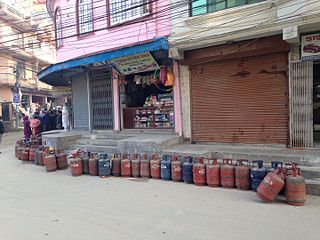
The 2015 India Blockade of Nepal, which began on 23 September 2015 and lasted about six months, was an economic and humanitarian crisis that severely affected Nepal and its economy.

The Federal Socialist Forum, Nepal was a democratic socialist political party in Nepal. The party came into being on 15 June 2015 with the merger of the Madhesi Jana Adhikar Forum, Nepal, the Federal Socialist Party Nepal and the Khas Samabeshi Party. On 6 May 2019, the party merged with Naya Shakti Party, Nepal to form Samajbadi Party, Nepal.
Madhesh Movement was a political movement launched by various political parties, especially those based in Madhes, for equal rights, dignity and identity of Madhesis Tharus, Muslims and Janjati groups in Nepal. In nearly a decade, Nepal witnessed three Madhesh Movements - the first Madhesh Movement erupted in 2007, the second Madhesh Movement in 2008 and the third Madhesh Movement in 2015. Ramesh Mahato was Madhesi martyr in 2007 at Lahan.

Nepal Federal Socialist Party is a political party in Nepal. The party was formed on 17 December 2016 by Mohammad Rizwan Ansari.
